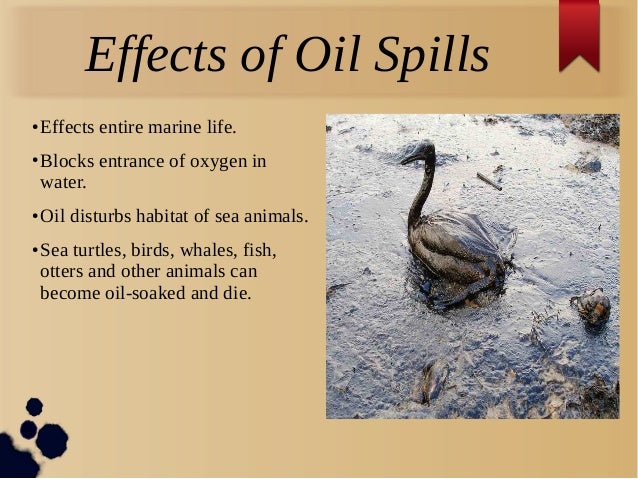Birds Fish and Sea Mammals. History says otherwise.
 Consequences On Marine Life And The Food Web Deepwater Horizon Oil Spill
Consequences On Marine Life And The Food Web Deepwater Horizon Oil Spill
Probably the most vivid examples of marine deterioration are the effects of oil spills.

Effects of oil spills on marine life. The material beneath the earths crust is often hazardous to the life above it. Oil spills can cause a wide range of impacts in the marine environment and are often portrayed by the media as environmental disasters with dire consequences predicted for the survival of marine. Apart from affecting the coastal fishing and fisheries exposure to oil spills may have negative health effects on marine life.
Waterfowl fish plants and living organisms suffer serious health effects after oil spills. Oil Spills Kill Fish Oil spills often take a deadly toll on fish shellfish and other marine life particularly if large numbers of fish eggs or larvae are exposed to the oil. Oil can be ingested inhaled and absorbed by marine life.
The nautical milieu may suffer from noxious and somatic smothering effects caused by oil spills. The effect on marine life as a result of an oil spill can vary greatly depending on many different conditions and factors that are present at the time of spill the type. The negative effects on marine life relate to the accumulation of persistent and bioaccumulative components of oil in the tissue and bodies of marine life fish with the potential to induce a variety of health and reproductive problems as well as mass mortality events within.
Many study reports have explicitly explored the imaginable impact of oil spills on marine flora and fauna. These experts are trained on how to clean oil from animals rehabilitate them and return them to the environment. Marine oil spills enhance the evaporation of volatile fractions such as low molecular weight alkanes and monoaromatic hydrocarbons.
Oil spills in oceans affect fish shellfish birds plants and other living organisms. Crude oil has many negative impacts on our environment. At the same time it undergoes a number of chemical and physical changes.
Oil spills are harmful to marine birds and mammals as well as fish and shellfish. Oil spilled from tankers is positive proof of this fact. Generally the effects of oil toxicity depend on a multitude of factors including the oil composition and characteristics physical and chemical condition ie weathered or not exposure routes and regimen and bioavailability of.
The spreading of marine oil spills is affected by the action of winds waves water currents oil type and temperature. Oil spills are particularly devastating to species that depend on the health of the ocean for their own survival. Oil Spills Destroy Wildlife Habitat and Breeding Grounds.
When these things happen they can deteriorate the thermal insulation of some organisms. The oil spill effects on the marine life is decided by the type of oil spilled location and the breeding season of the habitat in that area. Crude oil is poisonous and can cause the death of marine.
Oil destroys the insulating ability of fur-bearing mammals. Documented oil spills have release thousands or even hundreds of thousands of metric tones of oil into the ocean. The effects to marine life and habitat however are not small.
Marine oil spills can have a serious impact on marine life as well as on the economic coastal activities and the communities that exploit the resources of the sea. Effects of oil spills can be direct or indirect. Contact with oil can harm the insulation of feathers and fur leaving.
One of the major impacts is oil spills. Oil spills can affect the eggs of marine life such as fish and sea turtles both when the spill happens and later on. The intensity of aquatic effects is influenced by the nature and extent of the spilt oil.
Fisheries were impacted years after the Exxon Valdez spill due to the destruction of herring and salmon eggs when the spill occurred. Direct impacts include when oil directly touches is consumed or is injected through a cut in the skin. Though some animals may suffer and survive due to an oil spill sadly many animals also die from these disasters.
Effects include ulcers and damage to red blood cells kidneys liver and to the immune system. The main problem with oil is that once it spills it spreads far and wide in the ocean thereby increasing damage. While contact with oil itself puts marine life at risk it is also in danger when it comes to the clean up process associated with oil spills.
Overall studies indicate that while the responses of various marine species to oil and dispersants are quite variable a general picture is emerging that chemical dispersants may be more toxic to some marine organisms than previously thought and that small oil droplets created by dispersant use and directly consumed by marine organisms are often more toxic than crude oil alone. When marine animals consume the oil spilled in the water the oil gets into their body. Poisoning and Internal Damage Animals can be poisoned or suffer internal damage from ingesting oil.
These are killing and impacting the lives of marine life on our coasts. Following an oil spill there are specialists and veterinarians to deal with oiled wildlife. The health effects of oil spills include.
Oil vapors can injure to eyes and lungs and can be particularly hazardous while new oil is still coming to the surface and vapors are evaporating. There are two ways the marine life are being affected by the initial oil spill and the cleanup procedure which follows.
 An Anti Aging Facial Lifting Massage I Learned In Korea Try This At Home With Me Youtube
An Anti Aging Facial Lifting Massage I Learned In Korea Try This At Home With Me Youtube 








